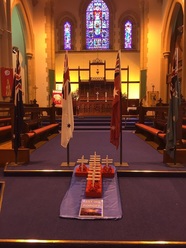
War is an evil and we are not here to celebrate it in any form. Wars open up opportunities for more evil, for anger, hatred, theft and human rights abuses of all kinds. Wars can shatter the human capacity for love and gentleness. Wars do not end in peace. They end in victory or defeat or dangerous stalemate. Peace, or shalom, wholeness, healing, takes a very long time afterwards to achieve and should never be let go lightly.
So why are we here today? We are here to remember the sinfulness of war; to acknowledge our human tendency to make a dreadful mess of things and to pray that we may do better. Today and every Remembrance Day our veterans remember their friends who never came home. We remember those who died too young and we also remember those like my parents who did not die, but whose lives and relationships were irrevocably changed in destructive ways. We give thanks for what our veterans did on our account, and what our serving forces continue to do, and we mourn the waste of human life and love...
The parables and preaching of Jesus Christ contain a constant and consistent message of peace and love for our enemies. Jesus instructs us for example in the sermon on the mount, 'love your enemies and pray for those who persecute you.' This is teaching that it can be very hard to adhere to in times of even supposedly justifiable conflict, which is why our life of prayer is most important. We need to pray for our armed forces and their families, in the pain and guilt that they endure on our behalf. We need to pray for our political leaders across the globe and for ourselves, because peace begins in the heart of each individual. And actions such as this service today, tokens of Remembrance such as the memorials in this church, and the stories of hardship and comradeship in suffering that we tell our children all help to remind us to pray.
But we need more. So where from a Christian perspective is there hope in the face of the suffering we inflict on one another? The teaching of St Paul we just heard read is of help. He sees the whole creation as labouring towards the birth of a new and whole universe. The suffering we endure is not the end, but the birth pangs of a new and wonderful order.
The medieval theologian Anselm of Canterbury famously wrote of faith seeking understanding 'I believe in order that I may understand.' The contemporary German theologian Jurgen Moltmann has amended this to hope seeking understanding: 'I hope in order that I may understand.' Now this is not just some kind of wishful thinking. This is robust hope. This is not a private, individual hope, but the hope of the whole of creation, relying on God’s goodness and the promise of God’s renewing work.
It is only this kind of hope in God that offers us a bigger picture in which to locate the terrible waste of human life that we have managed to produce, generation after generation. If we live without hope, if there is no horizon beyond the terror and loss of war then we must surely despair. But it is not an area in which we learn quickly. The waste of two world wars was not enough to save us from Korea, Vietnam, Bosnia, Afghanistan or Iraq or the current bloodshed in South Sudan and Syria to name but a few examples from the sad litany of recent decades. We do forget, again and again.
But beyond our failures, beyond the suffering of this present age, there is hope for a new creation towards which we are labouring with God. For make no mistake, this new creation of universal peace and love cannot be brought into being, even by God, without our help and collaboration. We labour together in hope and in the steadfast conviction that one day wars will cease, suffering and pain will be no more and love will triumph over all. And that is why on this day we pause to remember those who have suffered and died along the way, and commit ourselves afresh to peace, that their suffering may not have been in vain.
In the name of Christ the Prince of Peace. Amen
by Penny Jones, for Remembrance service @ St Luke's, 5 November 2016
 RSS Feed
RSS Feed